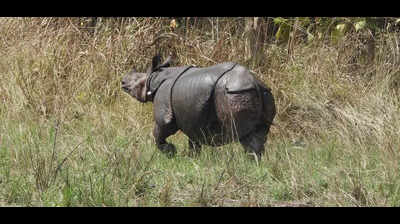- News
- City News
- bareilly News
- 2 Greater One-Horned Rhinos released in Dudhwa Tiger Reserve
Trending
2 Greater One-Horned Rhinos released in Dudhwa Tiger Reserve
Two Greater One-Horned Rhinos were released into the wild from Dudhwa Tiger Reserve, fitted with satellite collars for monitoring. This initiative, in collaboration with WWF-India, aims to restore free-ranging rhino populations in India's Terai landscape, contributing to ecological balance and biodiversity conservation.
PILIBHIT: Two Greater One-Horned Rhinos were released into the wild on Thursday afternoon after being fitted with IR-SAT (Iridium Satellite) collars by authorities at Dudhwa Tiger Reserve (DTR) in coordination with WWF-India rhino experts. Earlier, on Nov 27 last year, DTR officials and WWF had released three rhinos from an enclosure.
DTR field director H. Rajamohan said a male and a female rhino, both aged 15 to 20 years, were identified and tracked with the help of camp elephants and their trained mahouts. Expert teams tranquilised the rhinos, relocated them, and released them after assessing their health.
DTR currently houses 46 one-horned rhinos in two enclosures—one spanning 27 square kilometres and the other 14 square kilometres. "Our target was to release three female and one male rhino. In Nov, we released two females and one male, but the male returned to the enclosure within days. The reasons for this are still under study," Rajamohan said. "With the latest release of a male and a female, we have now met our target."
Dr. Dipankar Ghose, senior director of biodiversity conservation at WWF-India, said a stable free-ranging rhino population benefits the Terai landscape, one of the country's most productive ecosystems. "Rhinos disperse seeds through their dung, enriching the soil and supporting plant growth. They are key indicators of grassland ecosystems," he said.
Highlighting the benefits of this strategy, UP's principal chief conservator of forest (Head of Forest Forces) Sunil Chaudhary said, "Translocation helps re-establish free-ranging rhino populations, expand their habitat, and reduce inbreeding risks caused by prolonged enclosure confinement."
Anuradha Vemuri, the state's principal chief conservator of forest (Wildlife), called the relocation a major milestone. "After decades of effort, the mission to restore rhinos to India's Terai landscape is finally showing results," she said.

About the Author
Keshav AgarwalEnd of Article
FOLLOW US ON SOCIAL MEDIA









